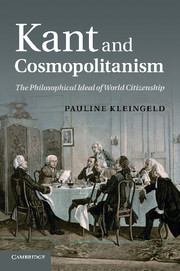Book contents
- Frontmatter
- Contents
- Acknowledgments
- Abbreviations and main primary texts
- Introduction
- Chapter 1 Kant and Wieland on moral cosmopolitanism and patriotism
- Chapter 2 Kant and Cloots on global peace
- Chapter 3 Kant’s concept of cosmopolitan right
- Chapter 4 Kant and Forster on race, culture, and cosmopolitanism
- Chapter 5 Kant and Hegewisch on the freedom of international trade
- Chapter 6 Kant and Novalis on the development of a cosmopolitan community
- Chapter 7 Kant’s cosmopolitanism and current philosophical debates
- Bibliography
- Index
- References
Chapter 2 - Kant and Cloots on global peace
Published online by Cambridge University Press: 05 November 2011
- Frontmatter
- Contents
- Acknowledgments
- Abbreviations and main primary texts
- Introduction
- Chapter 1 Kant and Wieland on moral cosmopolitanism and patriotism
- Chapter 2 Kant and Cloots on global peace
- Chapter 3 Kant’s concept of cosmopolitan right
- Chapter 4 Kant and Forster on race, culture, and cosmopolitanism
- Chapter 5 Kant and Hegewisch on the freedom of international trade
- Chapter 6 Kant and Novalis on the development of a cosmopolitan community
- Chapter 7 Kant’s cosmopolitanism and current philosophical debates
- Bibliography
- Index
- References
Summary
Cloots’ challenge
Between 1791 and 1793, a man who had named himself Anacharsis Cloots (1755–94) and who was a high-ranking Jacobin in revolutionary France, published several books in which he argued that the social contract tradition, by its own logic, should lead one to defend world-state cosmopolitanism. Cloots ardently defended social contract theory and did not mean this argument as a reductio ad absurdum. On the contrary, he regarded the unquestioned acceptance of a world with a plurality of states as an old prejudice. He formulated a challenge: “The prejudices spring from such deep roots that no one has even thought of asking: Why is there more than one state?” (RU 166).
Cloots advocates the establishment of a republic of the united individuals of the world. He argues, on the basis of the 1789 “Declaration of the Rights of Man and Citizen” and central ideas of social contract theory, that the only consistent political theory requires that there be only one state, a “universal republic” in which all humans would be citizens. Social contract theory justifies the establishment of states with coercive authority in terms of the (actual or hypothetical) agreement of individuals, and it regards the protection of their freedom and human rights as a good reason for individuals to subject themselves to state authority. Without the state, individuals would live in the “state of nature,” a condition in which they cannot be secure against violence by others. Taking this idea one step further than most social contract theorists, Cloots argues that establishing a plurality of states merely shifts the state of nature to the international realm. The human rights and interests of individuals are not adequately protected in a multi-state world, because no matter how well their state secures them internally, they are still threatened insofar as this state exists in a condition of war externally (an international state of nature). Hence the only real solution is the establishment of a universal republic of human beings of the world – “world citizenship” in the most literal sense.
- Type
- Chapter
- Information
- Kant and CosmopolitanismThe Philosophical Ideal of World Citizenship, pp. 40 - 71Publisher: Cambridge University PressPrint publication year: 2011



